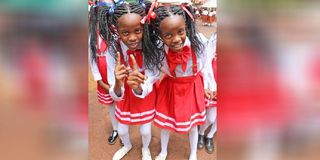Premium
Housing levy, banditry the key topics at drama festival

Friends School Tigoi presents a choral verse Basi Letu during the 62nd edition of the Kenya National Drama and Film Festival in Embu on April 8, 2024.
Identical twins Amani Akwe and Neema Hawo of Nairobi Primary School set Kangaru School hall ablaze with their narrative “Double Trouble” on the second day of the 62nd edition of the Kenya Schools and Colleges National Drama and Film Festival on Tuesday.
The pair’s performance captured the audience. The narrative is directed by Ms Martha Sienda.
Akwe and Hawi have similar voices, movements and even appearance. The audience, which included Kenya National Drama and Film Festival Executive Secretary James Indimuli and Deputy Executive Secretary Janet Lang’at, was evidently thrilled by the item presented by the girls.
According to “The Curse”, a play by Koilel Boys High School, the brain is like a balloon.
The more pressure it takes, the more the possibility of ‘exploding’. Lewis’ father, a chief executive officer in the city, finds himself under pressure arising from the tough economic times – rising fuel prices, a depreciating shilling, the Housing Levy and a “difficult” wife. The problems put a lot of pressure on the CEO, affecting the performance of Lewis in school.
Residents of Baba Lewis’ rural home travel to the city to cleanse what they think is a curse. However, the clearing of Lewis’ fee balance and house rent by a sponsor turns out to be the old man’s therapy.
Mukuuni Boys School, Tharaka Nithi County, was the talk of the day after presenting the play “Player Number 10”. The main character is Zawadi, a teacher, while the theme is banditry.
Destruction of property
Zawadi is recruited as a teacher and sent to a banditry-prone region. He imparts his football skills and knowledge to his students.
He opens a football academy with the vision of producing top players.
Everything goes well until an armed gang strikes. Its leader forces Zawadi and his students to stop “playing football like children” and join him in the valley to “defend our community” through stealing animals.
The only person to survive the ordeal is player number 10.
After an orgy of killing, cattle rustling and destruction of property, the bandits are apprehended by security agents. They abandon crime join the community in nation-building.

Double Trouble: Identical twins Amani Akwee and Neema Hawo of Nairobi Primary School during the 62nd edition of the Kenya National Drama and Film Festival at Kangaru School on April 8, 2024.
Zawadi, who had threatened to leave the banditry-prone valley and return to his home village, is happy to reassemble his footballers. The team takes part in a tournament and gets Sh5 million after emerging victorious.
Golden Elites School, Kisumu, had a play about a leadership struggle between two girls in a scouts troop. The play “Big Daddy” features Sheila Wanjiku-Samantha, Remmy Mirriams-Jackline among others.
It was written by Mr Enock Ndede, directed by Mr Barack Owino and produced by Mr Charles Ochome.
Nyangwa Boys High School had a standup comedy “village life”. The presenter, who introduced himself as “Kinuthia”, juxtaposed rural life with a surburb in Nairobi.
Kinuthia, in “Village Life” says he and other locals only saw Chapatis during Christmas festivities. His mother even numbered the chapatis she prepared.
“My mother could shout, ‘Kinuthia, ile chapati number 17 ile ilikuwa imeungua imeenda wapi (where is the burnt chapati number 17)?’ ” he said, to the amusement of the audience.
Coming out strongly
St Clare Maragoli School from Vihiga County presented an oral narrative, “Aunty wa Harrier”.
The narrative criticises the Kenya National Examinations Council and the Ministry of Education for the manner they pick students for national schools.
The producer of the narrative is Ms Jael Lusamukha.
Drugs and substance abuse comes out strongly in a Kiswahili spoken word genre “Baada ya Dhiki”.
Theta Secondary School’s Justine Kioko captured the imagination of the audience with the spoken word that decries the dangers of pregnant women taking drugs and alcohol.





